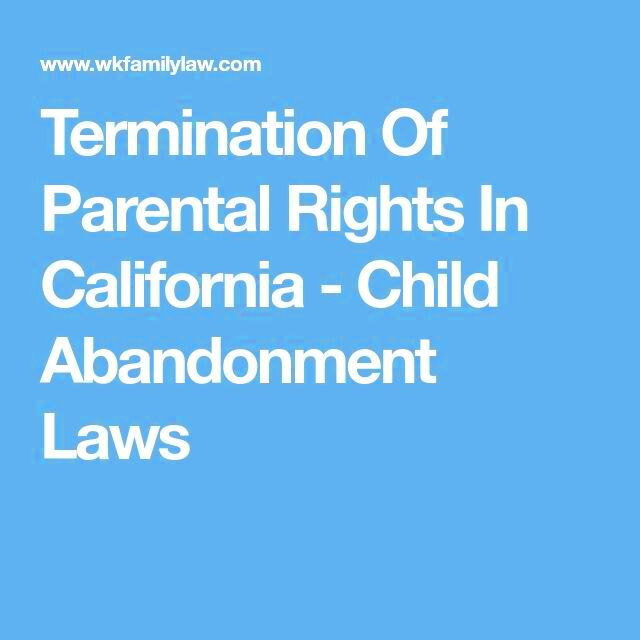California Abandonment Laws and How They Impact Family Matters
California’s abandonment laws play a significant role in family law cases. When one spouse or parent leaves without the intention of returning, it can affect everything from divorce proceedings to child custody arrangements. These laws help define what qualifies as abandonment and provide guidance on how it may impact legal decisions related to family matters. If you’re dealing with a family issue where abandonment is a factor, understanding the legal framework is crucial for protecting your rights and navigating the situation effectively.
What Constitutes Abandonment in California

Abandonment in California refers to situations where one spouse or parent leaves their family without any intention of returning. This can happen in two primary ways:
- Spousal Abandonment: When one spouse leaves the marital home and refuses to return, neglecting their responsibilities as a partner.
- Child Abandonment: When a parent leaves a child and fails to provide financial support or emotional care for an extended period.
For abandonment to be recognized legally, the following elements typically need to be proven:
- The abandonment was intentional.
- The abandoning party had no plan to return.
- The remaining spouse or parent was left without support or resources.
California courts often examine these factors closely, and the outcome can affect various aspects of family law cases, including custody and support decisions.
How Abandonment Affects Divorce Proceedings

Abandonment can have a significant impact on divorce proceedings in California. While California is a “no-fault” divorce state, meaning that abandonment is not necessary to file for divorce, it can still play a role in key decisions. Here are some ways it might affect the process:
- Spousal Support: If one spouse abandons the other without financial support, the abandoned spouse may have a stronger claim for spousal support during the divorce.
- Division of Property: Courts may consider abandonment when dividing marital assets, especially if one spouse left the other in financial difficulty.
- Custody Decisions: If a parent abandons their children, this could significantly influence custody arrangements, with the abandoned parent more likely to gain full custody.
It’s important to understand that while abandonment may influence the court’s decisions, it will not necessarily lead to punitive measures against the abandoning spouse or parent. However, it could provide leverage in certain aspects of the divorce settlement.
Abandonment and Child Custody Decisions
When it comes to child custody decisions, abandonment can be a key factor that the court considers. If one parent has abandoned the family, it raises concerns about their ability to provide a stable and supportive environment for the child. This can significantly impact custody arrangements, often tipping the scales in favor of the parent who has remained with the child. Understanding how abandonment affects custody decisions can help you prepare for what to expect in court.
California courts prioritize the best interests of the child when making custody decisions. If one parent has abandoned their child, the court may consider the following:
- Lack of Emotional Support: Abandoning a child can indicate that the parent is not committed to providing emotional care or a stable home environment.
- Failure to Provide Financial Support: If a parent has not contributed financially, it reflects poorly on their commitment to the child’s well-being.
- Absence from the Child’s Life: A prolonged absence could suggest that the parent does not have a meaningful relationship with the child, which can affect custody rulings.
In most cases, abandonment will weigh heavily in favor of the parent who has taken responsibility for the child, often resulting in full custody being awarded to them. However, courts may still allow the abandoning parent visitation rights if it’s in the child’s best interests.
The Legal Process for Proving Abandonment
Proving abandonment in a California family law case can be a challenging process, as it requires clear evidence that one party left without any intention of returning. If you believe abandonment is an issue in your case, understanding how to prove it is essential to achieving a favorable outcome.
Here are the steps involved in proving abandonment:
- Document the Absence: The first step is to provide a timeline showing the spouse or parent’s absence. This could include records of when they left, attempts to contact them, and their failure to return.
- Show Intent to Abandon: It’s crucial to demonstrate that the leaving party had no intention of returning. Evidence can include communication (or lack thereof) indicating that the person has cut ties with their family.
- Highlight Lack of Support: You will need to prove that the abandoning party did not provide financial or emotional support during their absence. This can be done through financial records or testimony from family members.
- Submit Testimonies and Evidence: Testimonies from friends, family members, or neighbors who can speak to the abandoning party’s actions will strengthen the case. Documents such as text messages or emails can also serve as evidence.
Once the evidence is gathered, your attorney will present it to the court, and the judge will evaluate whether the legal criteria for abandonment are met.
What to Do if You Are Accused of Abandonment
Being accused of abandonment can be a daunting experience, especially if the accusation is false or exaggerated. If you find yourself in this situation, it’s important to act quickly and carefully to protect your rights. The steps you take can significantly influence the outcome of your case.
Here’s what you can do if you are accused of abandonment:
- Gather Evidence of Your Involvement: If you have been actively involved in your family’s life, gather any evidence that shows your presence. This can include financial support records, communication with your spouse or children, and testimonies from people who can confirm your involvement.
- Maintain Communication: Stay in touch with your spouse and children. If there has been a gap in communication, explain the reasons for it (such as work or personal issues) to show that you did not intend to abandon them.
- Provide Financial Documentation: If you have been contributing financially, ensure you have proof of payments for child support, household expenses, or other family-related costs.
- Consult a Family Law Attorney: Seek legal advice immediately. A family law attorney can help you build a case that counters the abandonment claim and ensures your rights are protected in court.
If the accusation is unfounded, demonstrating your ongoing commitment to your family is the best way to defend yourself. Acting proactively and providing solid evidence will help clarify the situation in your favor.
Protecting Your Rights in Family Law Cases Involving Abandonment
Family law cases involving abandonment can be complicated, but it’s important to understand that you have rights that need protecting. Whether you’re the one accusing someone of abandonment or defending yourself against such claims, knowing the legal options available can make a huge difference in the outcome of your case. Taking the right steps early on will help you secure a fair decision in matters like custody, support, and property division.
Here are key ways to protect your rights in family law cases involving abandonment:
- Document Everything: Whether you are accusing someone of abandonment or defending yourself, having detailed documentation is crucial. Keep records of absences, communications (or lack thereof), financial support, and any attempts to resolve the situation.
- Seek Legal Advice Early: Family law cases involving abandonment can get tricky, so it’s essential to consult a family law attorney as early as possible. They can guide you through the legal requirements and build a strong case.
- Know Your Custody Rights: If children are involved, courts will prioritize their best interests. Ensure you know your rights as a parent, whether you’re fighting for custody or defending against accusations that you abandoned your child.
- File for Temporary Support or Custody: If your spouse has left, you may need immediate financial support or temporary custody arrangements. Filing for these can provide stability while the case is being resolved.
Protecting your rights is about staying proactive, gathering the necessary evidence, and working with legal professionals who understand the complexities of family law cases involving abandonment.
Common Misconceptions About Abandonment in California Family Law
There are several common misconceptions about abandonment in California family law that can cause confusion during legal proceedings. Understanding these misconceptions can help you avoid costly mistakes and ensure that you approach your case with the right expectations.
Here are some of the most widespread myths:
- Myth: Abandonment Automatically Grants Divorce: Many people believe that abandonment gives an automatic ground for divorce. However, California is a no-fault divorce state, meaning you can file for divorce regardless of whether abandonment has occurred.
- Myth: Leaving the Family Home Always Equals Abandonment: Simply leaving the home doesn’t necessarily constitute abandonment. The court needs evidence of an intention not to return and failure to provide support.
- Myth: Abandonment Leads to the Loss of Parental Rights: While abandonment may affect custody decisions, it doesn’t always result in a complete loss of parental rights. Courts will consider the overall circumstances, and the abandoning parent may still have visitation rights.
- Myth: Abandonment Equals Financial Penalties: Abandonment does not automatically result in financial penalties. However, it could influence decisions related to spousal and child support.
By dispelling these myths, you can approach your family law case with a clearer understanding of how abandonment is treated in California courts.
FAQs
What qualifies as abandonment in California family law?
Abandonment in California family law typically refers to one spouse or parent leaving the family without the intent to return, often coupled with a lack of financial or emotional support. The abandonment must be proven to impact the case.
How does abandonment affect child custody?
Abandonment can significantly impact child custody decisions. Courts may award full custody to the parent who remained with the child, as the abandoning parent may be viewed as incapable of providing a stable environment.
Can abandonment affect spousal support?
Yes, abandonment can influence spousal support rulings. If one spouse leaves and provides no financial assistance, the court may grant the abandoned spouse a more favorable support arrangement.
Do I need to prove abandonment to get a divorce in California?
No, California is a no-fault divorce state, so abandonment is not required to file for divorce. However, proving abandonment may affect other aspects of the case, such as custody or financial support.
Conclusion on California Abandonment Laws and Family Matters
California’s abandonment laws play a significant role in family law cases, especially in matters related to divorce, child custody, and financial support. Understanding how abandonment is defined, the legal process for proving it, and its impact on court decisions can help you navigate your case more effectively. Whether you’re dealing with an accusation of abandonment or seeking to prove it, staying informed about your rights and responsibilities is crucial. Consulting a family law attorney will ensure you approach the situation with the best legal strategy, protecting your interests and those of your loved ones.


